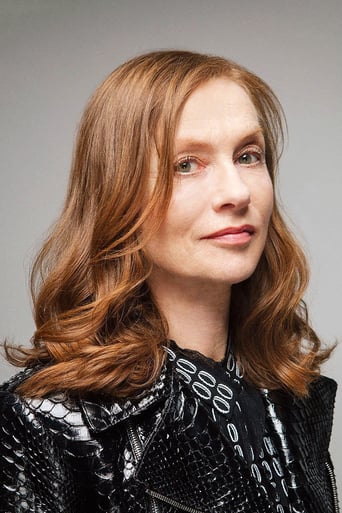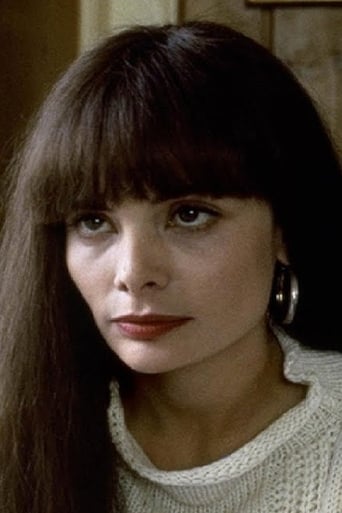FeistyUpper
If you don't like this, we can't be friends.
Lidia Draper
Great example of an old-fashioned, pure-at-heart escapist event movie that doesn't pretend to be anything that it's not and has boat loads of fun being its own ludicrous self.
Fleur
Actress is magnificent and exudes a hypnotic screen presence in this affecting drama.
Dana
An old-fashioned movie made with new-fashioned finesse.
allisonalmodovar
(The spoilers are noted each time before they are revealed.) I once watched a special on Claude Chabrol's career. It said that his constant theme is people falling into crime so slow, so gradually, they wonder how they got there. It dawned on me that this fit most of his films. However, that description fits this movie most of all.I think this was my second Chabrol film, so I didn't know what to expect at all. I don't even think I read the back cover. Isabelle Huppert plays a woman who begins to see Nazi forces at work right before WWII.(Spoilers: First her Jewish friend is taken away. When money runs low, she beings performing abortions and renting out her home to prostitutes so she can have luxuries for her children during WWII. She has an affair and her husband turns her in out of jealousy. From being a normal mother, suddenly she finds herself on death row for committing several abortions on prostitutes. You almost feel sorry for her, until she remains unrepentant to the end.) Such an incredible performance, even though Isabelle Huppert's character is thoroughly unlikable. It is actually a true story, based on Marie La Tour (Spoiler: the last woman to receive the death penalty in France).
pegd-1
With cool detachment and a subtle touch of horror, Claude Chabrol dissects the story of a woman who was guillotined during the Nazi occupation of France. One of his strengths as a director is that he allows the movie goer to form his/her own thoughts and opinions about the issues at hand. He is not a proselytizer. The film covers a lot of ground: illegal abortion, collaborating with the enemy, parenting, marital communication, greed and a slew of other human weaknesses. All of this against the backdrop of an occupied France, a country who witnessed the horrors of WWI and never fully recovered, and whose WWII soul (what is left of it) has been torn apart.Isabelle Huppert does a fine job interpreting Marie LaTour, the woman in question. Marie is not the most sympathetic of characters. In fact, most of the major characters are not "sympathique".(My favorite character is the prostitute Lulu, acted by Marie Trintignant.)All in all a well directed, well structured film about a tragic period in the lives of the French people. But you be the judge.Trivia: "Vera Drake" and "L'Affaire de Femmes" both begin in apartments which have the the same god awful green walls.
dbdumonteil
This is a true story and the heroine is not unlike Louis Malle's hero "Lacombe Lucien".They are too coarse,too immature to realize what they are doing.Lucien could have opted for the Resistance,but he's deemed too stupid by the schoolteacher and he winds up in Collaboration.Chabrol's heroine only wants to "help" her neighbors before she realizes she can earn a lot of dough with abortion.Chabrol watches his character as an entomologist,as she makes her way through those troubled times:the world has gone mad,and anyway is abortion worse than what the authorities are doing with the Jews ?Maréchal Petain's France was so humiliated that it tried to make up with it by focusing on "morality".The heroine could make also think of Violette Nozières,another Chabrol movie which also featured Huppert.And she's also akin to Sandrine Bonnaire's character in "la cérémonie".All are women overtaken by events,all are victims of a well-meaning society,Chabrol's trademark. "Une affaire de femmes" is certainly a good work although it lacks the sweep and the directing innovations of his late sixties/early seventies classics.
Dennis Littrell
Claude Charbrol's stark and unsentimental masterpiece about the last woman to be executed in France--she was guillotined for performing abortions in Nazi-occupied France during World War II--forces us to see a side of war not often depicted. What does a woman with two little children do when her country is occupied by the brute forces of the enemy? How is she to find enough to eat, to buy the increasingly scarce and costly necessities of life? How is she to find joy in life? Women often turn to prostitution during such times, but Maire Latour does not. Instead she aborts the foetuses of the prostitutes and of other women impregnated, often by the Nazis. In a sense this is her "resistence." However she prospers and takes up with a Nazi collaborator. In the process she reduces her husband to frustration and humiliation.Isabelle Huppert as Marie Latour is mesmerizing in a role that allows her talent full latitude. She is clear-headed and sly as a business woman, warm and ordinary as a mother, cold and brutal as a wife, childish and careless as an adulteress, resourceful and fearless as an abortionist, and unrepentant as she awaits the executioner (foreshadowed, by the way, by her son, who wants to be an executioner when he grows up). Francois Cluzet plays her husband Paul, and he is also very good, especially at rousing our pity. Charbrol makes it clear that both Marie and Paul are victims, not only of war, but of their divergent natures. Paul wants the love of Marie, but she wants only a man that represents success and power, a man who is clean-shaven, not the menial worker that he is. Marie Trintignant is interesting and convincing as a prostitute who becomes Marie Latour's friend and business associate.While abortion is indeed "Une affaire de femmes" this film is about much more than that. No doubt the title is there to emphasize Charbrol's point that men really do not (did not then, and do not now) really understand abortion and why it is sometimes a horrible and abject necessity. When Marie is taken to Paris for a show trial she exclaims to a woman in jail with her, referring to the court that will pass judgment on her, "It's all men...how could men understand?" We can see that men really can't, and that precisely is what this movie is all about: showing us just how horrible pregnancy can be under the circumstances of enemy occupation.A secondary story here, not quite a subplot, is Paul's story. What does a man do when he and his children are dependent on a woman who doesn't love him, a woman who rejects him and even goes so far as to arrange for the cleaning woman to sleep with him? It is not only Marie who humiliates him, but it is the defeat of his country, the easy surrender to the Nazis that has so reduced him. This is made clear in a scene late in the film between two lawyers who voice their shame as Frenchmen in a time of defeat.What Paul does is not pretty (and I won't reveal it here), but so great is the provocation that one understands his behavior and can forgive him.(Note: Over 500 of my movie reviews are now available in my book "Cut to the Chaise Lounge or I Can't Believe I Swallowed the Remote!" Get it at Amazon!)




